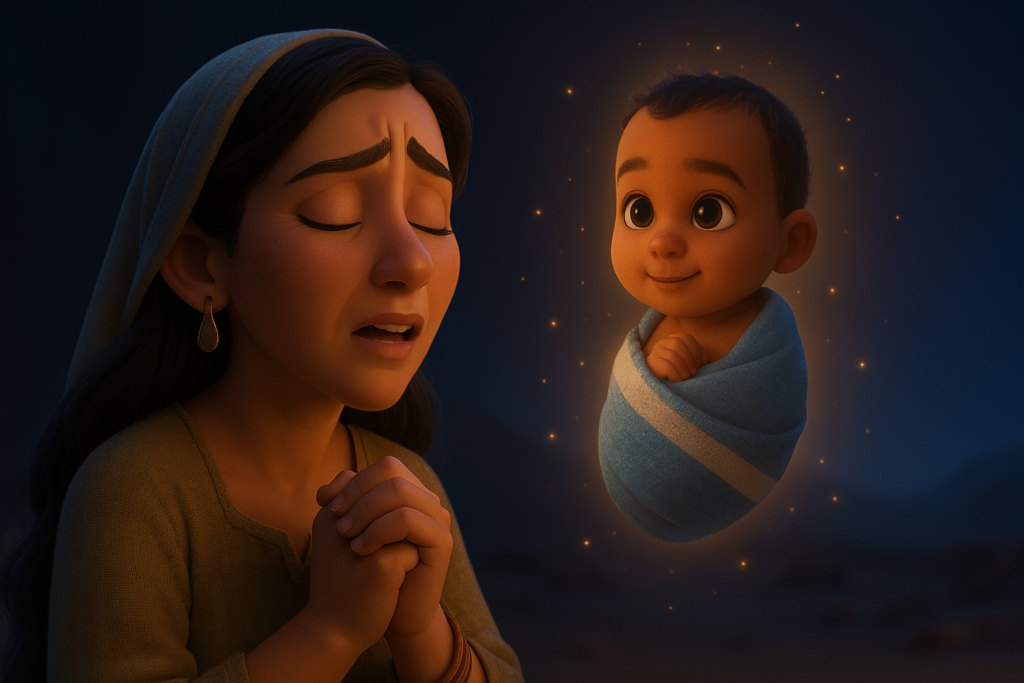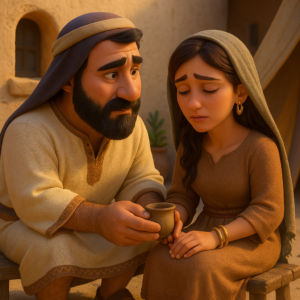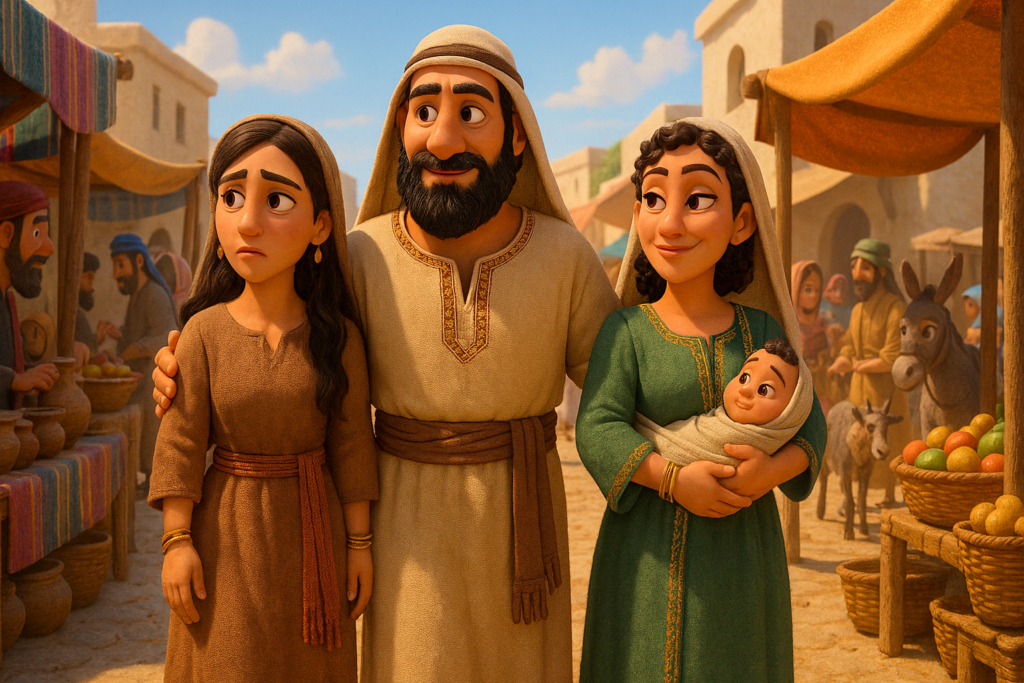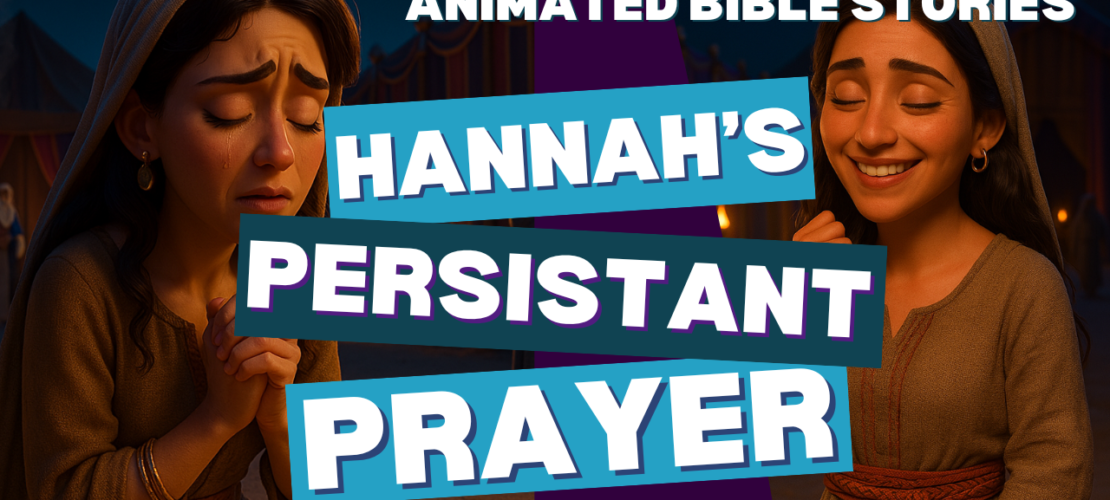Can one woman’s prayer really change history? In this animated Bible story from 1 Samuel 1, we meet Hannah — the woman whose bold prayer and unshakable faith would lead to the birth of one of Israel’s greatest leaders.
Before David and his famous battle with a giant, there was Samuel, the Last Judge, who would unite the scattered tribes of Israel under their first King—but at a cost.
Samuel’s story, though, also had a beginning, a woman named Hannah, who fought for her children before they were even conceived.
Watch the Animated Bible Story of Samuel
This short, animated Bible story is part of the ongoing Saga of Samuel—a true-to-Bible reimagining of the early chapters of 1 Samuel. See Scripture come to life with vivid animation and historical insights as our heroes delve into the true costs of leadership and the corruption that always follows power.
➤ Perfect for family devotions, church groups, or personal Bible study — especially for those seeking deeper biblical literacy in a creative, story-based way.
✍️ Written and narrated by a natural born storyteller with two master’s degrees in Christian education and early Christian theology, this series reimagines the Bible as it was meant to be understood: faithfully, fully, and in context.
*AI Disclosure: This video uses AI-generated visuals, animations, and background music to enhance storytelling. All theological content and creative direction are human. All scripts, narration (apart from the song), and biblical teaching are fully written, voiced, and theologically guided by a human author with advanced degrees in Christian education and early Christian theology. AI tools were used solely to assist in visual and audio production.
Motherhood in Bible Times
Hannah is determined to be a mother. It is a dream that she cannot abandon, even after years of disappointment and heartbreak.

Certainly, Hannah’s situation is not unique. Women (and men) throughout history have struggled with infertility, its crushing disappointment, and the real effects it has on their families and communities.
The realities of the ancient world, however, add yet another dimension to this situation.
All women in the ancient world assumed they would become mothers. It was the full-time career aspiration of the entire of the entire female “species.” No, this is not necessarily the way it should be—it is, though, the way it was.
Division of Labor
Men (all men) faced death in war to protect their homes, families, and communities. All women faced death in childbirth to continue their homes, families, and communities into another generation.
Men engaged in backbreaking labor on the farm or tending livestock in order to feed and house their families. Women literally fed their children and tended to the home itself. There was a certain equality in this division of labor which modern societies have lost sight of.
Hannah’s disappointment involved more than the wish for a child alone. She was also mourning a lost vocation. From childhood, she would have had this one dream: to be a mother and to raise a family. This was her very purpose in existence, and it had been denied to her.
Even a devoted husband could not overcome the devastating sense of loss. As much as she may have loved Elkanah, the reality is, Hannah probably had not married because she wanted a husband—any more than a modern woman would interview for a job because she wants coworkers.

In all likelihood, Hannah married because that was the path to motherhood.
As a modern woman myself, I appreciate the other career options now open to women. Changing times and values, though, should not blind us to the heroic endeavors of women past. Hannah’s refusal to sacrifice her dream career should be every bit as inspirational to us today as any women climbing corporate ladders or breaking so-called “glass ceilings.”
The Great Miracle
The theme of miraculous pregnancy and birth, usually following prolonged infertility, runs from one end of the bible to the other. We might say it begins in Genesis chapter 3, when the first woman is named Eve. Eve (Havvah) is a form of the Hebrew word that means “to live” or “to exist.” The first woman is named Eve (Havvah/life) because “she would the mother of all living [humans],” (Genesis 3:20).
From that moment on, the Bible portrays women as co-authors with God in the brining life into the world.
A significant number of male heroes in the bible are conceived after prolonged periods of infertility. Alternatively, as in Moses’s case, they have mothers who go to great lengths to protect their children (Exodus 2:1-10). The biblical theme is undeniable, consistent, and poignant:
Women are the life-giving agents of this world, protectors and champions “of all living.”
The Mother’s Covenant
This life-giving covenant—what I call the mother’s covenant—remains throughout between God and women. The male part in reproduction was well known in Bible times. The husband’s part is mentioned in all of these stories, but never emphasized. Women alone are the life-givers. This theme continues up until Mary, the mother of Jesus, whose “miracle birth” does not involve any male human at all.
Mary—theologically speaking—is the truest fulfillment of the covenant sealed way back in Genesis with the naming of Eve.
Before Mary, though, we have a grand parade of miracle mothers – women failed by nature, or kings, or husbands, who nonetheless, through the agency of God alone, do bring new life into the world.
Even in this crowd, Hannah stands out. Her determination and refusal to give up on her destiny should inspire all of us who feel called to seeminly impossible dreams.
But Polygamy—Oh My!
The issue of polygamy (Elkanah and his two wives) is rather problematic in our modern context. Some might even doubt my assertion that Elkanah “truly loved Hannah.” Others will see the situation as downright abusive.
Here’s the thing: Polygamy was practiced in ancient Israel primarily in cases of infertility. Back then, this wasn’t just a family problem. Children were vital to the survival of the entire community. So, when a first wife could not have children, the husband would often have to marry a second wife and fulfill the family’s obligation to the community.

In all likelihood, therefore, Hannah was Elkanah’s first wife, with Peninnah entering the family because of Hannah’s “failure” to produce a child.
The antics of certain biblical kings notwithstanding, polygamy was never the normal nor encouraged form of marriage, even in the Old Testament. Old Testament law allowed polygamy for practical reasons—namely, that without a consistently high birth rate, all of Israelite society would cease to exist.
Today, for several good reasons, most people and cultures tend to frown on or outright despise polygamy. Others shrug it off as an embarrassing footnote in history. However, the only practical alternative in Hannah and Elkanah’s case would likely have been divorce. It was not, at that time, understood that men could be infertile, and children were considered essential to all marriages.
The reality of polygamy, in their own time and culture, likely allowed Elkanah and Hannah to remain married.
🕊️ Stay tuned to follow my ambition scheme to Reanimate the Bible — one episode at a time.
